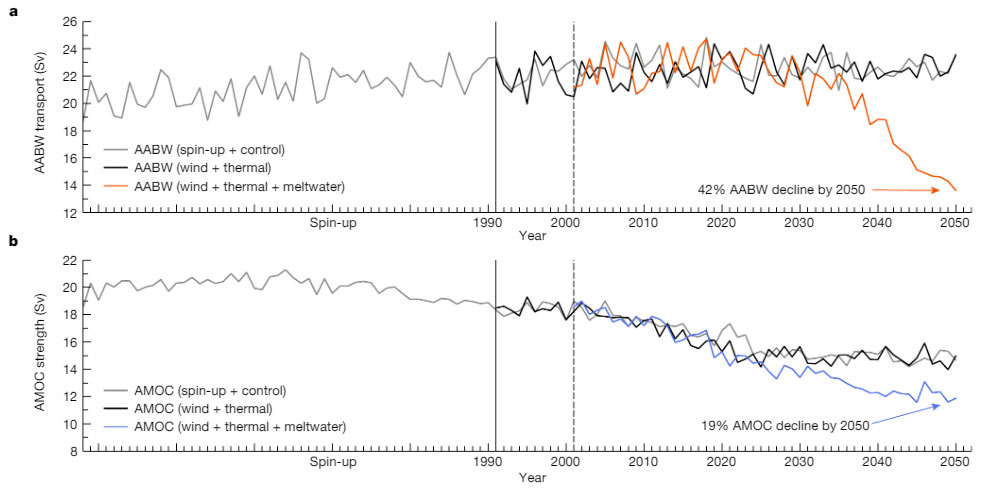Antarctic ice melt slows Deep Ocean Current with potential Impact on World’s Climate for Centuries
According to new research published in Nature, melting ice around Antarctica will cause a rapid slowdown of a major global deep ocean current by 2050.
New research by Australian scientists suggests deep Ocean slowdown within a few decades could alter world’s climate for centuries.
According to new research published in Nature, melting ice around Antarctica will cause a rapid slowdown of a major global deep ocean current by 2050 that could alter the world’s climate for centuries and accelerate sea level rise.
If greenhouse gas emissions continue at today’s levels, the deepest Ocean current could slow down by 40% within three decades. The result could generate a cascade of impacts including higher sea levels, altered weather patterns and impacts for marine life – starving off a vital source of nutrients.
A team of researchers, lead by Qian Li now at the Massachusetts Institute of Technology – examined the deep ocean current that plunges down off Antarctica’s continental shelf below 4,000 meters and spreads to ocean basins around the globe.
Projected global overturning circulation changes out to 2050

Image: Time series of annual-mean Antarctica Bottom Water (AABW) transport (a) and Atlantic Meridional Overturning Circulation (AMOC) strength (b) from the spin-up and control run (grey line), the [wind + thermal] run (black line) and the [wind + thermal + meltwater] run (orange and blue lines).
Study coordinator Matt England, of the Climate Change Research Centre at the University of New South Wales in Australia, and a co-author of the research pointed out that the whole deep ocean current was heading for collapse on its current trajectory.
“In the past, these circulations have taken more than 1,000 years or so to change, but this is happening over just a few decades. It’s way faster than we thought these circulations could slow down. We are talking about the possible long-term extinction of an iconic water mass.”
The study configured climate models to compute what would happen in regards to the deep ocean around Antarctica – when adding the fresher water runoff from the ice sheets.
The model was setup based on the global greenhouse gas emissions on their current path, but England notes that lower emissions could lessen the amount of ice melting which – in turn – could slow the decline. Because the slowdown of the deep ocean current relates to the amount of water that sinks to the bottom and then flows north.
Global Impacts for Centuries
The study did not attempt to explain or quantify the knock-on effects, but the authors note that the slowdown would “profoundly alter the ocean overturning of heat, fresh water, oxygen, carbon and nutrients, with impacts felt throughout the global ocean for centuries to come”.
In a briefing the researchers said:
- The deep ocean current influences the climate around the world, and has the potential to radically shift rainfall.
- A slowdown of the deep ocean current causes those water masses to heat up.
- More heat could cause the upper ocean around the continent to get hotter, kicking off a feedback loop where more melting causes accelerated slowing of the current, which then causes more heating and more ice sheet melt.
- The deep water that warms the fastest in the study was in the same areas – particularly in west Antarctica – where ice sheets were already vulnerable and melting.
“We don’t want to set off a self-reinforcing mechanism in those places,” England said, adding that the slowdown effectively stagnates the deep ocean, starving it of oxygen.
When ocean organisms die, they add nutrients to the ocean water that sinks to the bottom and circulates around the world’s ocean. Those nutrients get returned in upwells that feed phytoplankton – a foundation for the marine food chain.
Steve Rintoul, an oceanographer and expert on the Southern Ocean at the Australian government’s Commonwealth Scientific and Industrial Research Organisation (CSIRO), said as the deep ocean circulation slows, fewer nutrients would be returned to upper layers of the ocean – affecting the production of phytoplankton. This process would play out over century-long timescales.
“Once that overturning circulation slows down, we can only get it back again by no longer releasing meltwater around Antarctica, which means we need a cooler climate and then have to wait for it to restart. The longer we go on with higher rates of greenhouse gas emissions, the more changes we commit ourselves to.”
And noted, the modelling was in line with recent observations of changes to the deep ocean circulation that was suggesting a slowdown may already be taking place.
Rintoul added: “Going back 20 years, we thought the deep ocean wasn’t changing that much. It was too far away to be responsive. But the observations and the models have shown that’s not the case.”
The Atlantic Meridional Overturning Circulation (AMOC)
Scientists also think another major ocean circulation in shallower waters that spans the entire Atlantic Ocean – known as the Atlantic Meridional Overturning Circulation – is also slowing down.
Stefan Rahmstorf, an oceanographer and head of earth system analysis at the Potsdam Institute for Climate Impact Research, said the new study – with which he was not involved – showed “a dramatic further weakening is likely around Antarctica in the coming decades”.
Models presented in the major UN climate reports had a “longstanding and major shortcoming” because they didn’t capture how meltwater influences the deep ocean. The ocean depths were refreshed in only a few places on the planet close to major ice sheets in Greenland and Antarctica.
“Unfortunately, these locations are all close to the ice sheets of Greenland and Antarctica, which are melting away as a result of fossil-fuel-caused global warming.
“The meltwater dilutes the salt content of these ocean regions, thereby making the ocean waters less dense and thus not heavy enough to sink down and push away the waters already there.”
A slowdown in the deep ocean current could also affect the amount of CO2 that the deep oceans could lock away.
Not just the Atlantic overturning circulation #AMOC is getting weaker: it looks like Antarctic bottom water is following suit.
— Prof. Stefan Rahmstorf 🌏 🦣 (@rahmstorf) March 29, 2023
New study by @ProfMattEngland et al.
Melting Antarctic ice predicted to cause rapid slowdown of deep ocean current by 2050 https://t.co/6a4DVGVi1T
This article is based on Graham Readfearn‘s article Melting Antarctic ice predicted to cause rapid slowdown of deep ocean current by 2050 published in The Guardian. Teaser image via Unsplash.
Related
New Research Sparks Concerns That Ocean Circulation Will Collapse https://e360.yale.edu/features/climate-change-ocean-circulation-collapse-antarctica
